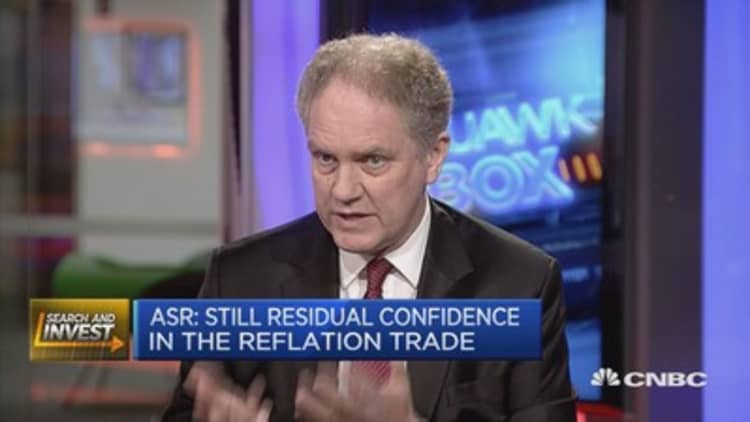
Amid the political uncertainty of Brexit, mounting social turmoil over immigration and barely there economic growth, Europe has improbably emerged as the hot stocks trade this year.
The postelection rally in U.S. equities is looking tired as gridlock has sapped momentum in Washington. Investors have been looking for a better place to grow cash, and the European market is quickly becoming the favorite target.
"We believe that the underlying performance of European equities is potentially misunderstood by market participants," Henry McVey, head of global macro and asset allocation for private equity powerhouse KKR, said in a lengthy report for clients. "We also believe that European equities, financials in particular, are poised to perform well in 2017."
The market has begun to take notice.
With money pooled in U.S. stocks beginning to dry up, cash is flowing to Europe. Over the past week, investors pulled $800 million from U.S. stock funds and pushed $1.9 billion to their European counterparts, the largest inflow in 60 weeks, according to Bank of America Merrill Lynch.
Stock indexes have responded in kind. Germany, France and Italy all posted multiyear highs Friday. Germany's DAX is looking at its fourth monthly gain in a row, Italy's is looking at its best month of the year and France's CAC is likely up for the third quarter in a row.
All of those gains come at a time when the U.S. market has been sluggish following the Trump rally. The was on target to end March little changed, while the Dow industrials were on pace to drop more than 0.5 percent. The Nasdaq tech barometer was the sole index to post a solid gain for the month, up about 2.1 percent.
The rush to Europe has multiple roots: There's the general valuation story, with the index trading at a multiple that's 15 percent lower than the S&P 500, according to Chris Zaccarelli, chief investment officer at Cornerstone Financial Partners. Zaccarelli said a focus this year on Europe and emerging market exposure "has been a good call" with respective gains of 7 percent and 12.5 percent for client portfolios.
There's also less worry about a potentially explosive political situation, despite Britain's exit from the European Union.
"In many areas, we can expect the political news to get better (or at least less bad), which should alleviate that headwind," Brad McMillan, chief investment officer at Commonwealth Financial, said in a note. "In Europe, the news is good: the Dutch elections resulted in a victory for the center, the French polls are trending that way, and the situation in Germany is also favorable."
The coming 'paradigm shift'
To be sure, so much momentum for a single trade has its dangers, and KKR's McVey tempered his enthusiasm somewhat, telling investors to be tactical and at least a little cautious about allocations.
"Investors should continue to think about a European macro environment where consumption, particularly around experiences, remains compelling relative to overall trend growth," he said.
KKR has raised its full-year GDP forecast for Europe from 1.4 percent to 1.7 percent — still less than the 2 percent or so expected for the United States and well below the 3.4 percent global forecast from the International Monetary Fund, but moving in the right direction. The firm believes not only that consumption will rise but also now sees an improving investment picture.
It's all part of a four-part "paradigm shift" identified by KKR: increased focus on fiscal rather than monetary policy, a move toward deregulation, an inflow of capital and heightened volatility driven by central bank stimulus efforts.
From a sector standpoint, McVey backs travel, health and beauty and home improvement. In addition, he likes banks as well as investments connected to private infrastructure and technology.
Analysts at Jefferies also are on the Europe train, giving clients five reasons to join the trade: The fading deflation threat; a cheap euro compared to other global currencies; economic uncertainty that is abating; a more optimistic outlook on corporate profits as expressed through upward earnings revisions; and more tepid investor sentiment in Europe compared to the U.S.
Jefferies believes there's a good chance that Europe will outperform the U.S., at least through the summer.


